Banned sausages still being served to children in schools and kindergartens
Tons of sausages are still being served to children in schools and kindergartens, despite the discontent of some parents as well as an order of the Ministry of Health which has banned the overfat cold cuts since 2012. The ministry has recently issued another order by which it wishes to indefeasibly take the sausages off the menu in schools and kindergartens since 1st of June. As only a few days are left until then, it is not known whether all the kindergartens will manage to remove the sausages from the menu. The authorities are not in a hurry to terminate the contracts with the providers since the order has not been published in the Official Gazette yet.
„We refuse the sausages, however the education division gives them back to us again”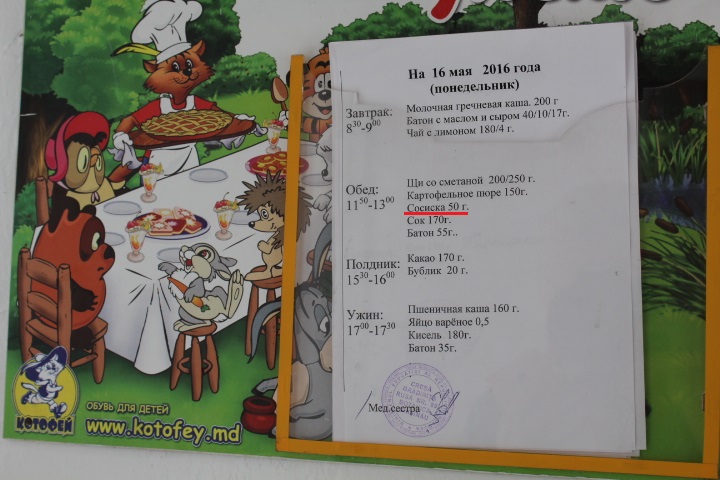
Each Monday, sausages are served for lunch at the kindergartens from district of Botanica of the capital city – per 50 grams to each child. It is occurring while at the kindergartens from the other districts this product has been taken off the menu after the parents made a scandal and the Ministry of Health came up with a decision to indefeasibly ban it. The directors of the kindergartens state they would have given up on this product long ago, but the decisions are made at the Education Division, thus, all that they can do is to comply.
„We refused sausages many times, we took the necessary steps at the Education Division, but the heads had already organized the tender, so these sausages came back again to be on the menu”, Irina Andriuța, director of kindergarten no. 89 says. According to her, the institution prepares the meals in line with a Sample Menu approved by the Education, Youth and Sports Division (DETS) of Botanica district for 2015-2016. The document provides for the sausages to be served for lunch to children on the first day of the week.
We will have to make a fasting menu
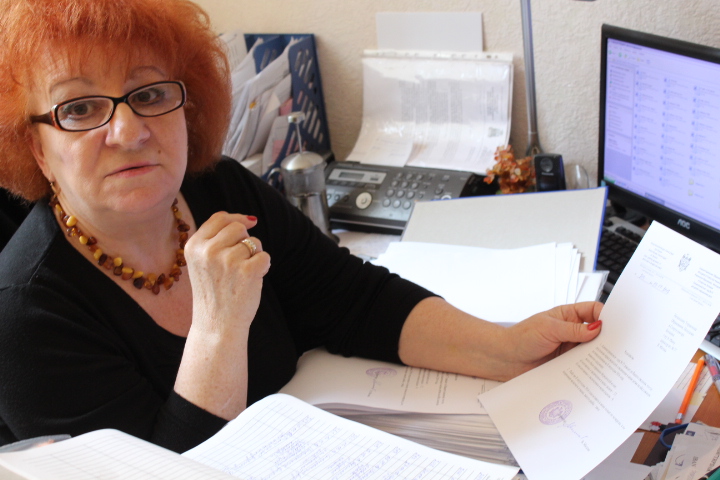
Sausages served also in nurseries
In March, several parents from Chisinau signed an online petition, published on the Corruption Map, in which they were complaining that their children are fed unhealthily in kindergartens, especially with sausages, and requested the local authorities to take measures. After having made the verifications, the Education, Youth and Sports Division of the capital city said that, in fact the cold cuts were not dangerous for the children’s health. The parents were not talked into it and at the end of April put forward another complaint. „The fresh fruit and vegetables are either not on the children’s menu in most of the kindergartens, or are provided only occasionally. The children are served with food which requires oil-based thermal processing (baking/hardening) and other unhealthy and unsuitable foods for young children, as pickles, buns, biscuits and wafers”, the new petition says. Contacted by CIJM, the signatories complained that the children from the nurseries are also fed with sausages.

„Once the order has been placed, one cannot withdraw it”
The Education, Youth and Sports Division from Botanica has signed a contract with Rogob company, which shall deliver sausages to those 30 kindergartens in the district until 31st of July. Igor Roșca, deputy head of the Division has stated that the products are still being served to children in the kindergartens because the agreement has not been terminated yet, whereas the product had been ordered. „We shall comply with the order issued by the Ministry of Health and shall exclude (the sausages) altogether but under the provisions of the contract, so as not to pay the state money as penalty for contract termination. Our person responsible for public procurement has not found the order of the Ministry of Health yet, and as soon as it appears, we shall immediately, on 30th of May, stop the delivery and will ask for the termination of the contract.” Igor Roșca underlines.

Sausage providers: „No one has announced us yet”
The representatives of Rogob company – the company which, in February, won the tender to deliver for six months sausages to the kindergartens in Botanica district, stated that no one had told them that the contract would be terminated before the term. Alexandru Enache, company lawyer claims that a sudden termination of the contract would generate loss for the company. „We are following every Official Gazette; we haven’t seen the respective order published. No one has announced us so far about the termination of the contract. All we know is from hearsay”, Alexandru Enache specified.
In his turn, Ghenadie Donici, head of sales of the enterprise, has said that the company shall comply with the decision of the authorities once the order comes into force. „If there is a document which regulates or bans something we have to follow it. So far, there is currently no document. One shouldn’t play games with the state - one should do what is required”, Donici states.
Some kindergartens found the solution
In some kindergartens from other districts of the capital city, the managers say they have found the solution after the sausages were taken off the menu. The product 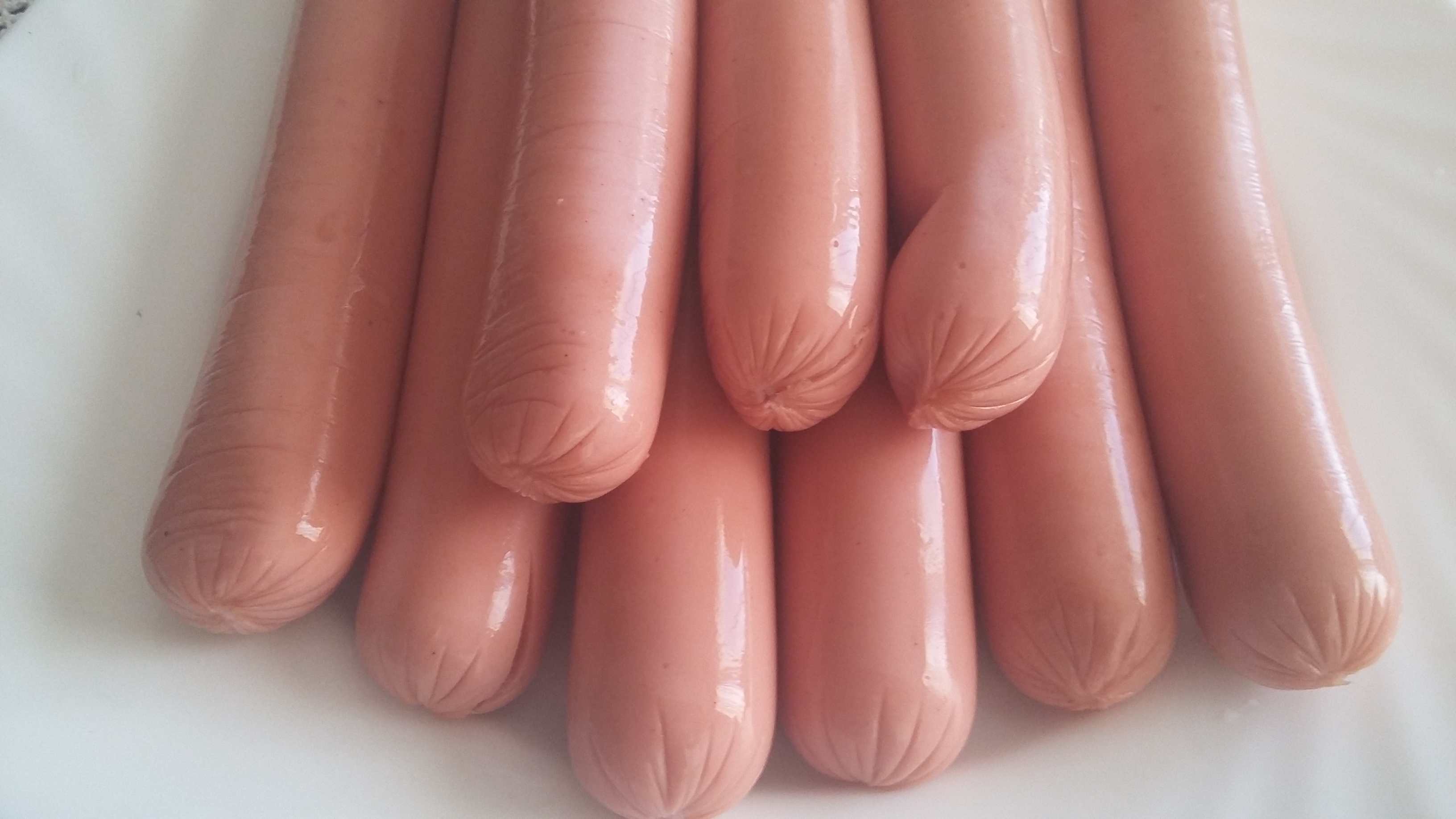 has been replaced by fish and chicken meat. As the expenses rose – the daily menu costing about 18 lei- some institutions asked the parents for help. „We have a request drafted with the parents and approved by the division, to add two lei from the parents. With those two lei we get a menu of 20 lei and it rarely occurs that we exceed the amount. We were thinking of increasing the parents’ contribution if the prices rise, however we are coping for now. And since there has been this trouble with the parents, we have introduced, for three weeks now, fresh fruit served at 10:00 o’clock: bananas, apples, oranges”, Silvia Gherciu, methodologist of the kindergarten no 46 says. However, on the day we visited the kindergarten, there was no fruit on the menu.
has been replaced by fish and chicken meat. As the expenses rose – the daily menu costing about 18 lei- some institutions asked the parents for help. „We have a request drafted with the parents and approved by the division, to add two lei from the parents. With those two lei we get a menu of 20 lei and it rarely occurs that we exceed the amount. We were thinking of increasing the parents’ contribution if the prices rise, however we are coping for now. And since there has been this trouble with the parents, we have introduced, for three weeks now, fresh fruit served at 10:00 o’clock: bananas, apples, oranges”, Silvia Gherciu, methodologist of the kindergarten no 46 says. However, on the day we visited the kindergarten, there was no fruit on the menu.
„We are surely coping without sausages, although the children ate them”
„The children are on semi-products. We have been telling them „eat the porridge, too”, whereas they were staying with the sausage... We are surely coping also without sausages, although the children ate them. But since the Ministry of Health has said No, then it is No”, Silvia Gherciu explains.
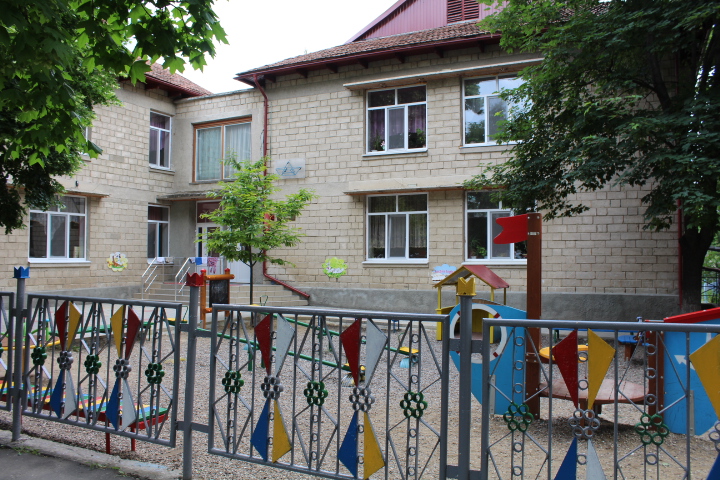
We want beef instead of sausages
In another district- Buiucani- the sausages have been given up to as well due to some of the parents’ discontent, Veronica Solomițchi, the head of Education Division says. Consequently, the directors of all the kindergartens were interviewed and the parents who had opted for the exclusion of the product were questioned. „On 29th of April, we organized another tender, as we are conducting them once every 3 months, and have not included this product into the bulletin. Instead, we increased the quantity of chicken breast, although I think there should be also beef on the children’s menu. It was taken off the diet following the scandal some years from now, when it was discovered that instead of beef, horse meat had been provided. If we indicate in the specifications specifically enough: fillet, chicken legs, etc., and request the product to be packaged, we could provide a diversified menu to the children. Beef is important for nutrition.”, Veronica Solomitchi concludes.
A ton of sausages each month
The delivery was stopped in Ciocana district also after the parents had come up with criticism. Valentina Cocol, head-accountant of the district DETS says that since 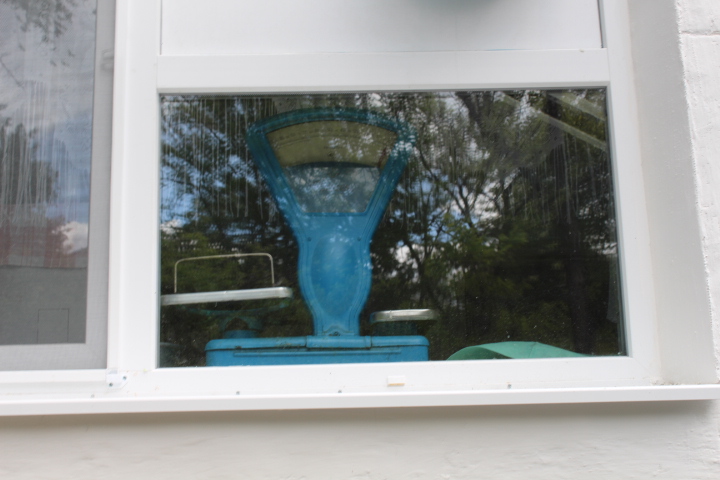
The DETS of Rascani district also managed to solve the problem with the sausages. Dumitru Vatavu, deputy head of this division states that he doesn’t even remember when they disappeared from the menu. „We have not organized tenders since then (before 2016) and we are not serving meat on Monday. The same menu remained, but without sausages. We used to serve per 50 gr. to each child on the first day of the week and had a contract with Rogob. The parents were against it and we have not included the product in the tender any longer”, Vatavu states.
Each minister with his own order
An order which bans the use of cold cuts in kindergartens, as well as of other products which contain too much fat and sugar was issued by the Ministry of Health already in 2012. The document bans also selling these products in schools and kindergartens as well as near the educational institutions (on a range of up to 100 meters). In the order signed by Andrei Usatii, former minister, it is mentioned that the list of the banned products shall be updated in five years, that is in 2017. However, another order signed by Ruxanda Glavan, minister in office, comes to replace it. The new order bans among others „including in the menu of the general educational institutions meat products with food additives (cold cuts and sausages)”.
NCPH: „What can the poor child eat for 17 lei, only pasta and bread.”
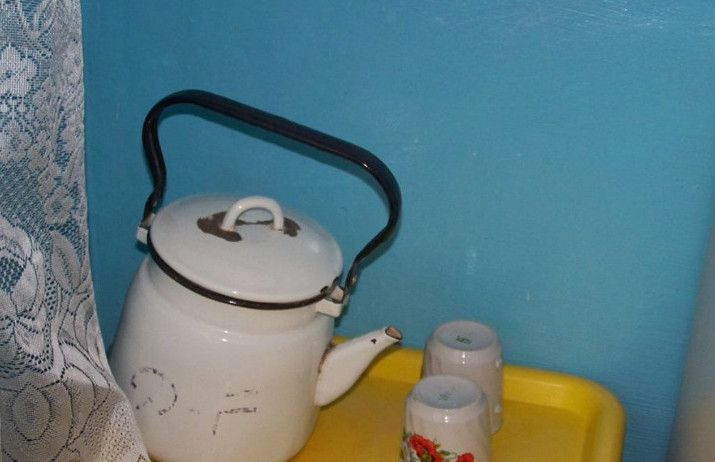 Over the 4 years from the entry into force of the order of the Ministry of Health which bans fat cold cuts in kindergartens and schools, the responsible persons from the National Centre for Public Health (NCPH) state that the managers of the educational institutions and the chefs of schools are those who check the norms of the fat content not to be overrun. And as basis serve the invoices and the information indicated by the economic agents on the package of the product.
Over the 4 years from the entry into force of the order of the Ministry of Health which bans fat cold cuts in kindergartens and schools, the responsible persons from the National Centre for Public Health (NCPH) state that the managers of the educational institutions and the chefs of schools are those who check the norms of the fat content not to be overrun. And as basis serve the invoices and the information indicated by the economic agents on the package of the product.
NCPH has lately conducted a number of controls in the kindergartens of the country, and the conclusion is the same as over the last years: the menu is not diversified. „We are making the menu as it should be and we know how it should be and menus are approved, but the problem is a financial one, because with the 17 lei in the kindergarten and the 7 lei in school as it is currently provided for the daily nutrition, the physiological needs are not really covered. What can a child eat for 17 lei?! He/she eats pasta and bread and what else is there. In some institutions the parents contribute with additional money, while in the villages the situation is deplorable”, Mariana Tutunaru, head of the Child and Youth Section at the NCPH states. According to her, after the controls, NCPH shall come up with a set of methodological recommendations, which are currently being compiled, for the educational institutions where new menus shall be proposed. „We have everything; however we have no money for the children to eat healthily. A normal menu should cost over 20 lei.”, the civil servant adds.
She says that currently the kindergartens and the schools of the country are mobilizing to take the processed meat off the menu following the order of the Ministry of Health. „Once a week, cold cuts used to be served both in schools and in kindergartens. Now everyone is calling to ask us what to do not to include the cold cuts any longer, as they are already making the procurement plan. As soon as it is published in the Official Gazette, the cold cuts shall be dropped off.”, head of the Child and Youth Health Section states.
An order given ostensibly
As for the order of the Ministry of Health of 2012, Mariana Tutunaru says that it has been drafted in line with the norms set forth by the European Union. „It is applied, but there, they referred to the cold cuts which do not exceed 20 gr. of fat per 100gr., and what was served was compliant. However now, they have been excluded all together because in 2015 WHO assessed over 800 scientific researches in this field and found that the cold cuts may lead to colorectal cancer after a certain age if consumed frequently”, Tutunaru specifies.
The explanation is hallucinatory given the fact that half a year already passed and the authorities haven’t reacted in any way to the warning from WHO. The new order was issued only after the parents had asked out loud the cold cuts to be removed from the children’s diet.
A study from Romania: sausages with colorants extracted from bugs
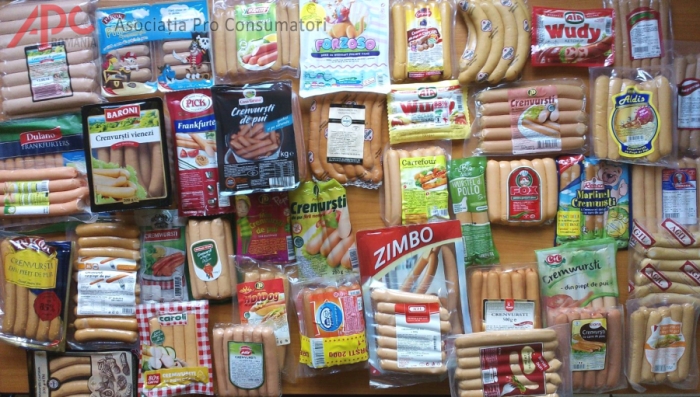 Recently, our neighboring country, Romania, has conducted a study on the quality of sausages which are sold on the Romanian market. The research, which was carried out on 43 types of sausages, has shown that the Romanians eat sausages with colorants from bug powder – carminic acid - a red shining colorant obtained from a species of insect called cochineal. At the same time, 93 per cent of the analyzed products contain additives, that is Es, and for 91% sodium nitrite had been used, a food preservative which may generate medical diseases if the product is baked. The study came up with proves that the tasty product which we frequently give to our children could cause leukemia. The producers of cold cuts criticized the results, stating that the products meet the norms in force and pose no health risk to children.
Recently, our neighboring country, Romania, has conducted a study on the quality of sausages which are sold on the Romanian market. The research, which was carried out on 43 types of sausages, has shown that the Romanians eat sausages with colorants from bug powder – carminic acid - a red shining colorant obtained from a species of insect called cochineal. At the same time, 93 per cent of the analyzed products contain additives, that is Es, and for 91% sodium nitrite had been used, a food preservative which may generate medical diseases if the product is baked. The study came up with proves that the tasty product which we frequently give to our children could cause leukemia. The producers of cold cuts criticized the results, stating that the products meet the norms in force and pose no health risk to children.
The investigation has been done in the framework of the Campaign „Public Money Is My Money Too”, conducted by the Centre for Journalistic Investigations (CJI) and the Association for Efficient and Responsible Governance (AGER), within a project funded by the European Union and the National Endowment for Democracy.
Investigations in the same category:
The stories from www.anticoruptie.md may be used in the limit of up to 1,000 characters. Web pages must indicate the source and link directly to the article. Print media, Radio and TV stations must indicate the source. Publishing full version of stories is allowed based on a prior agreement with the Center for Investigative Journalism. Articles published on www.anticoruptie.md are protected by the Law on copyright and related rights of Republic of Moldova.
Comments
